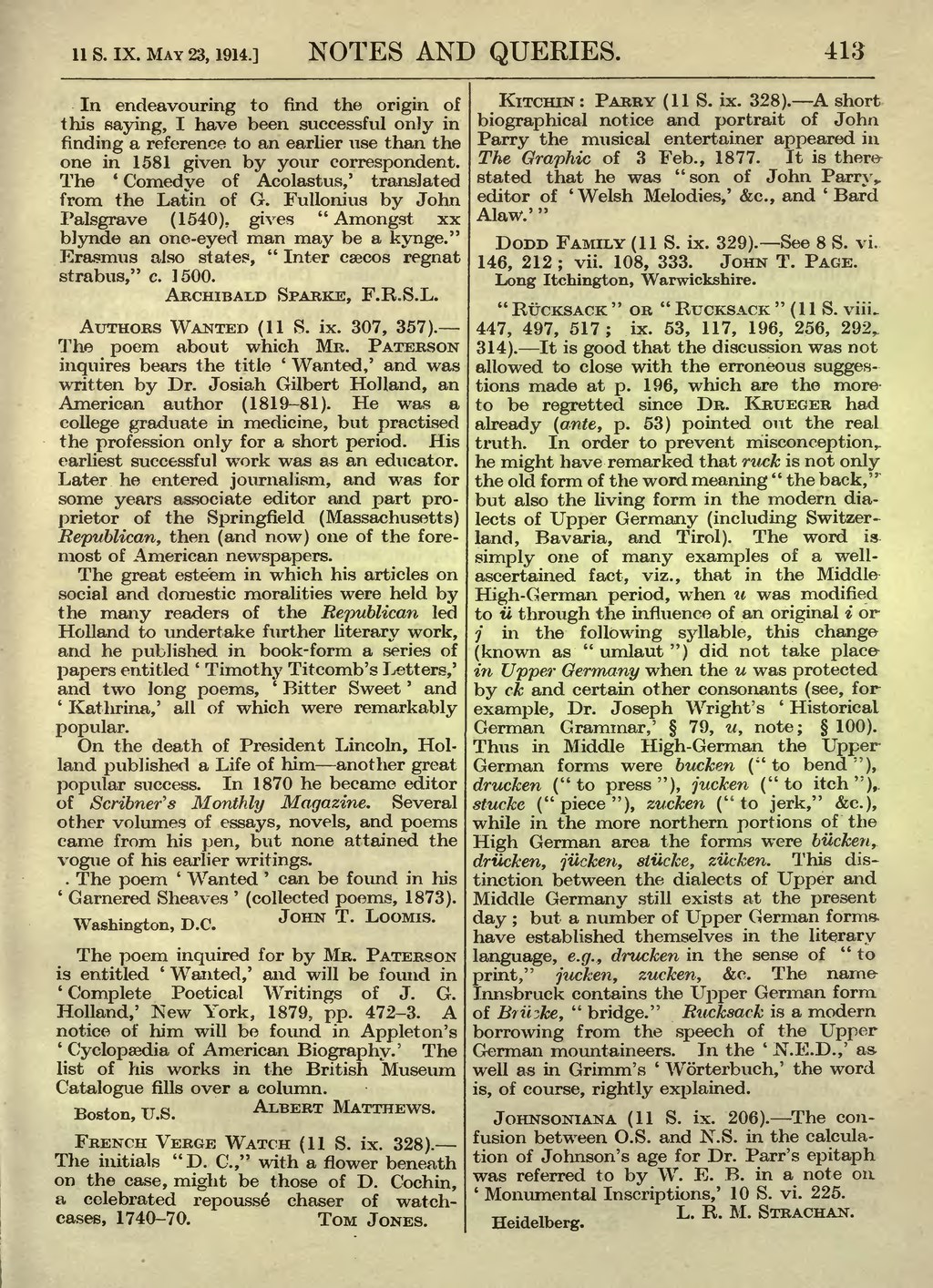us. ix. MAY 23, i9i4.] NOTES AND QUERIES.
413
In endeavouring to find the origin of
this saying, I have been successful only in
finding a reference to an earlier use than the
one in 1581 given by your correspondent.
The ' Comedye of Acolastus,' translated
from the Latin of G. Fullonius by John
Palsgrave (1540). gives "Amongst xx
blynde an one-eyed man may be a kynge."
Erasmus also states, " Inter csecos regnat
strabus," c. 1500.
ARCHIBALD SPABKE, F.R.S.L.
AUTHORS WANTED (US. ix. 307, 357). The poem about which MR. PATERSON inquires bears the title ' Wanted,' and was written by Dr. Josiah Gilbert Holland, an American author (1819-81). He was a college graduate in medicine, but practised the profession only for a short period. His earliest successful work was as an educator. Later he entered journalism, and was for some years associate editor and part pro- prietor of the Springfield (Massachusetts) Republican, then (and now) one of the fore- most of American newspapers.
The great esteem in which his articles on social and domestic moralities were held by the many readers of the Republican led Holland to undertake further literary work, arid he published in book-form a -series of papers entitled ' Timothy Titcomb's Letters,' and two long poems, ' Bitter Sweet ' and ' Kathrina,' all of which were remarkably popular.
On the death of President Lincoln, Hol- land published a Life of him another great popular success. In 1870 he became editor of Scribner's Monthly Magazine. Several other volumes of essays, novels, and poems came from his pen, but none attained the vogue of his earlier writings. . The poem ' Wanted ' can be found in his ' Garnered Sheaves ' (collected poems, 1873).
Washington, B.C. JOHN T ' LoOMIS '
The poem inquired for by MR. PATERSON is entitled ' Wanted,' and will be found in ' Complete Poetical Writings of J. G. Holland,' New York, 1879, pp. 472-3. A notice of him will be found in Appleton's ' Cyclopaedia of American Biography.' The list of his works in the British Museum Catalogue fills over a column.
Boston, U.S.
ALBERT MATTHEWS.
FRENCH VERGE WATCH (US. ix. 328).
The initials "D. C.," with a flower beneath
on the case, might be those of D. Cochin,
a celebrated repousse chaser of watch-
cases, 1740-70. TOM JONES.
KITCHIN: PARRY (US. ix. 328). A short
biographical notice and portrait of John
Parry the musical entertainer appeared in
The Graphic of 3 Feb., 1877. It is there-
stated that he was "son of John Parry r
editor of 'Welsh Melodies,' &c., and 'Bard
Alaw.'"
DODD FAMILY (US. ix. 329). See 8 S. vi. 146, 212 ; vii. 108, 333. JOHN T. PAGE. Long Itchington, Warwickshire.
" RUCKSACK " OR " RUCKSACK " (11 S. viii.. 447, 497, 517; ix. 53, 117, 196, 256, 292,. 314). It is good that the discussion was not allowed to close with the erroneous sugges- tions made at p. 196, which are the more to be regretted since DR. KRUEGER had already (ante., p. 53) pointed out the real truth. In order to prevent misconception r he might have remarked that ruck is not only the old form of the word meaning " the back," but also the living form in the modern dia- lects of Upper Germany (including Switzer- land, Bavaria, and Tirol). The word is simply one of many examples of a well- ascertained fact, viz., that in the Middle High-German period, when u was modified to ii through the influence of an original i or j in the following syllable, this change (known as" umlaut ") did not take place- in Upper Germany when the u was protected by ck and certain other consonants (see, for example, Dr. Joseph Wright's * Historical German Grammar,' 79, u, note; 100). Thus in Middle High-German the Upper- German forms were bucken (" to bend"), drucken ("to press"), jucken ("to itch"),. stucke (" piece "), zucken (" to jerk," &c.), while in the more northern portions of the High German area the forms were bucken, drucken, jucken, stucke, zucken. This dis- tinction between the dialects of Upper and Middle Germany still exists at the present day ; but a number of Upper German forma have established themselves in the literary language, e.g., drucken in the sense of "to print," jucken, zucken, &c. The name Innsbruck contains the Upper German form of Bvihke, " bridge." Rucksack is a modern borrowing from the speech of the Upper German mountaineers. In the ' N.K.D.,' as. well as in Grimm's ' Worterbuch,' the word is, of course, rightly explained.
JOHNSONIANA (US. ix. 206). The con- fusion between O.S. and N.S. in the calcula- tion of Johnson's age for Dr. Parr's epitaph was referred to by W. E. B. in a note on ' Monumental Inscriptions,' 10 S. vi. 225.
Heidelberg. L. B. M. STRACHAN.
